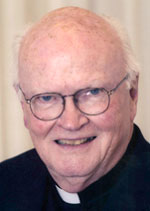If you enjoy playing around with letters, just rearrange the ones that make up the word “listen” and you’ll notice the word “silent” looking you right in the eye. The rearrangement provides you not only with another word, but also with another dimension of meaning for both words.
Silence is a great listening environment. Noise, particularly your own, makes it virtually impossible for you to listen. And listening, particularly respectful, attentive, focused-on-another-person kind of listening, can carry you into deeper depths of silence.
People who always have to have background noise and who, as some say, “can’t stand to be alone,” are diminished people to the extent that they prefer noise to quiet and choose being busy over solitude. They’ve been caught in the cultural confusion between solitude and loneliness.
Loneliness can indeed be a form of living death and something to be avoided. But solitude is a chosen form of isolation that can enrich one’s humanity and prepare one for meaningful connection with others, perhaps even with God.
[hotblock]
So it is interesting to note that a movement that originated in the Philadelphia area a few years ago called “Speak Up!” aims to summon teenagers out of emotional separation from their parents and create a welcoming environment where youngsters can be heard by parents.
Parents are encouraged to speak up as well in the presence of their offspring. The aim is to break the silence that separates them and allow youngsters and elders to be alone together in a supportive environment.
School settings in the evenings seem to be the preferred venue for Speak Up! Gatherings are typically, but not exclusively, Catholic, and the meetings are facilitated by an informed presenter. That person speaks in a general session, followed by breakout discussion groups organized around topics of interest.
The topics include alcohol and drugs, weekend curfew rules, responsible driving, chastity and sexuality, as well as use of money and in-school intellectual growth. I’ve observed these sessions and noticed that, curiously, the discussion groups tend to draw unrelated sets of youngsters and elders.
Parents listen to other parents’ kids; youngsters speak to parents who are not their own. Nonetheless, good things happen. One father told me that the drive home from a Speak Up! session was the first time he ever had a meaningful conversation with his daughter.
Speak Up! is one mother’s response to the AIDS-related death of her son. His parents were unaware of his problems with sexuality, drugs and alcohol. They never talked about such things. No one ever spoke up. Now 20 years later, others can.
The rules of the game are simple. First, “Let’s agree to agree.” To do that we must “have respect for the opinions, feelings and boundaries of others,” the rules say. The discussion environment has to be “safe and nonjudgmental.” Participants have to “support each other through the learning process.”
Moreover, “out of respect for each other, confidentiality is important.” There must also be a “willingness to listen to what others have to say.” And, “let’s agree to speak one person at a time.” All of this is lifted from a booklet that reaches 26 schools and thousands of Speak Up! participants every year.
You can look at material at www.speakup.org to see what’s there. There’s a lot to be gained from respecting silence and learning to listen.
***
Father Byron is university professor of business and society at St. Joseph’s University, Philadelphia. Email: wbyron@sju.edu.




Share this story